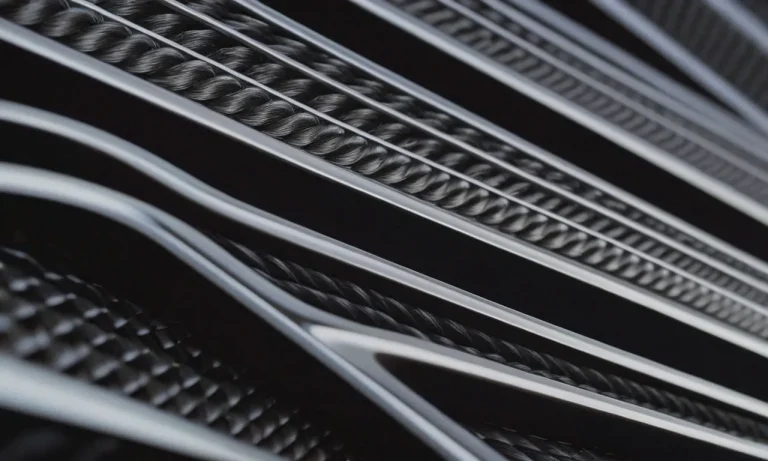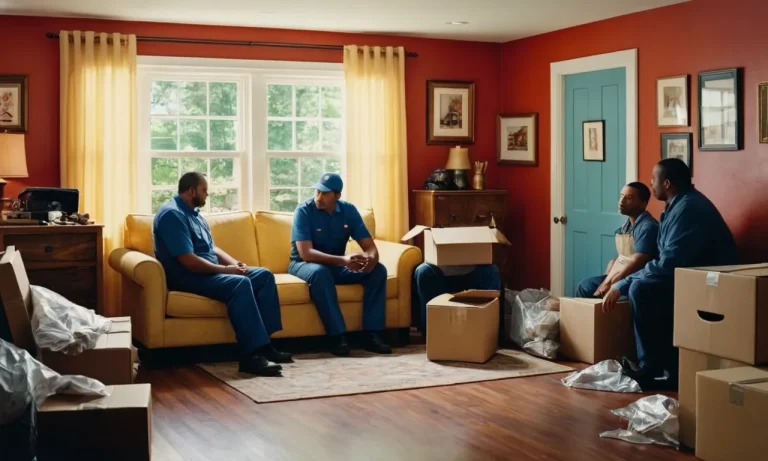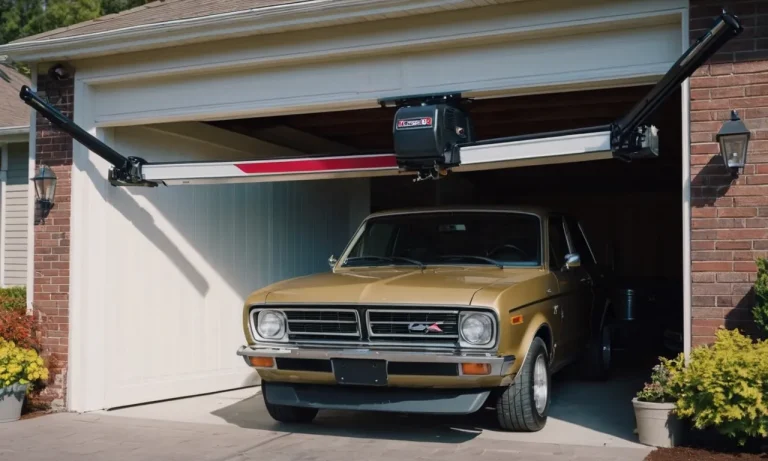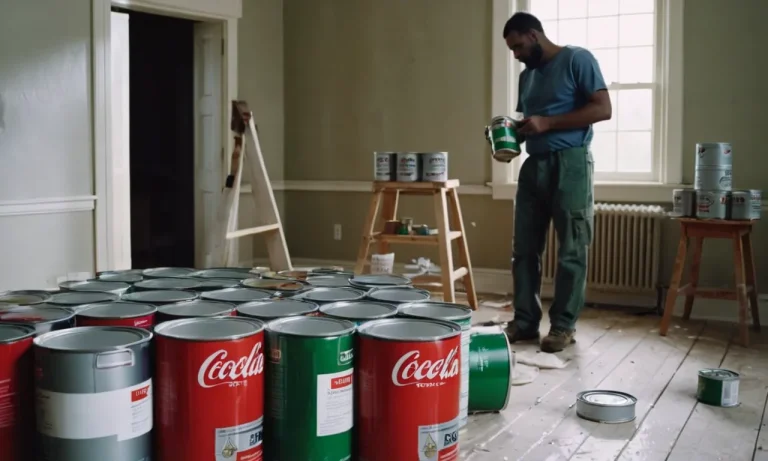Garage Door Not Closing? Here’S How To Fix It
Having issues getting your garage door to fully close using the remote? You press the button, the door goes down part way, then stops or goes back up. Frustrating, right? Don’t worry – in most cases, this problem is easy to diagnose and repair yourself.
Here’s a quick answer: The most likely culprits are misaligned sensors, low batteries, stuck tracks, or broken springs. Carefully inspecting the sensors, tracks, springs and motor can help identify the issue.
In this comprehensive guide, we’ll walk through all the common reasons a garage door won’t close with the remote and show you how to troubleshoot and fix the problem yourself.
Make Sure Sensors are Properly Aligned
Sensors prevent door from closing on obstruction
Garage door sensors are designed to ensure the safety of you and your family by preventing the door from closing on any obstructions. These sensors are usually placed on either side of the door, near the ground. When the door is closing, an invisible beam is emitted between the sensors.
If something interrupts this beam – such as a person, pet, or object – the door will automatically reverse its direction. This prevents any accidents or injuries that could occur if the door were to close on someone or something.
Beam must be unbroken for door to close
In order for the garage door to close properly, the beam emitted by the sensors must be unbroken. If the door is not closing and the sensors are not aligned properly, it may cause the beam to be interrupted even when there is no obstruction.
This can be a frustrating problem but fortunately, it is usually an easy fix.
Check alignment and connections
To fix the issue of a garage door not closing properly, start by checking the alignment of the sensors. Ensure that they are facing each other directly and that there are no obstructions blocking the path of the beam.
If they are misaligned, gently adjust them until they are pointing directly at each other. It may be helpful to use a level to ensure they are perfectly aligned.
Additionally, check the connections of the sensors. Make sure the wires are securely connected to both the sensor and the garage door opener. If any wires are loose or damaged, they may need to be repaired or replaced.
If you are unsure how to properly realign the sensors or if you suspect there may be a larger issue with your garage door, it is recommended to consult a professional technician. They have the expertise to diagnose and fix any problems with your garage door system.
For more information on garage door maintenance and repairs, you can visit www.thespruce.com or www.familyhandyman.com.
Check Batteries in Remote and Motor
If your garage door is not closing properly, one of the first things you should check is the batteries in both the remote and the motor. A low battery can cause intermittent function and prevent the door from closing completely.
Low battery can cause intermittent function
When the batteries in your remote or motor are running low, they may not have enough power to operate the garage door consistently. This can result in the door only partially closing or not closing at all. It’s important to regularly check the battery levels to ensure they are functioning properly.
Replace batteries in remote every 6 months
To prevent any issues with your garage door, it’s recommended to replace the batteries in your remote every 6 months. This will ensure that you have a reliable power source for operating the door. It’s a simple and inexpensive maintenance task that can save you from potential frustrations in the future.
Motor battery should be replaced every 2-3 years
In addition to the remote batteries, it’s also important to check the battery in the motor itself. This battery is responsible for powering the motor and ensuring smooth operation of the garage door. It should be replaced every 2-3 years to maintain optimal performance.
If you’re unsure about how to check or replace the batteries in your garage door remote or motor, consult the manufacturer’s manual or contact a professional for assistance. Keeping your batteries in good condition is essential for the proper functioning of your garage door and can help prevent any potential issues in the future.
Inspect Tracks and Rollers
Tracks must be straight and aligned
One of the first things you should check if your garage door is not closing properly is the condition of the tracks. Over time, the tracks can become misaligned or bent, causing the door to get stuck or not close all the way. Use a level to ensure that the tracks are straight and aligned.
If you notice any irregularities, such as gaps or bends, you may need to adjust or replace the tracks. This can be done by loosening the screws that hold the tracks in place, aligning them correctly, and then tightening the screws back up.
Rollers should spin freely with no grinding
The rollers on your garage door play an important role in its smooth operation. If the rollers are worn out or damaged, they can cause the door to get stuck or not close properly. To inspect the rollers, simply look for any signs of wear or damage.
Additionally, try spinning the rollers with your hand to see if they move freely and without any grinding noises. If you notice any issues, it may be time to replace the rollers. You can find replacement rollers at most home improvement stores or online.
Lubricate rollers and hinges if needed
Proper lubrication is crucial for the smooth functioning of your garage door. Over time, the rollers and hinges can become dry and rusty, which can cause the door to stick or not close properly. To prevent this, regularly lubricate the rollers and hinges with a silicone-based lubricant.
This will help reduce friction and ensure that the door operates smoothly. Apply the lubricant to the rollers and hinges, making sure to wipe away any excess. Regular maintenance and lubrication can help extend the lifespan of your garage door and prevent future issues.
Test and Adjust Springs
Extension and torsion springs wear out over time
One of the most common reasons why a garage door fails to close is due to worn-out extension or torsion springs. These springs are responsible for counterbalancing the weight of the door, making it easier to open and close.
However, over time, these springs can become weak or damaged, causing issues with the door’s functionality.
According to a study conducted by GarageDoorRepair.com, springs typically have a lifespan of around 10,000 cycles, which translates to about 7 to 10 years of regular use. After this point, the springs may start to show signs of wear and tear and may need to be replaced.
Imbalanced or broken springs prevent closing
If your garage door is not closing properly, it could be due to imbalanced or broken springs. Imbalanced springs occur when one side of the door has a stronger spring tension than the other, causing the door to unevenly close.
Broken springs, on the other hand, can prevent the door from closing altogether.
When dealing with imbalanced or broken springs, it’s important to address the issue as soon as possible. Leaving the problem unresolved can lead to further damage to the door’s mechanism and potentially pose a safety hazard.
Adjust or replace springs – caution as springs are under high tension
Adjusting or replacing garage door springs should be approached with caution, as these springs are under high tension and can be dangerous if mishandled. It is recommended to hire a professional garage door technician to perform this task to ensure safety and proper adjustment.
However, if you have experience and are confident in your abilities, you can attempt to adjust the springs yourself. Just remember to follow all safety precautions, including wearing gloves and eye protection, and using the appropriate tools for the job.
When it comes to replacing springs, it is best to leave it to the experts. They have the knowledge and experience to safely remove the old springs and install new ones, ensuring that the door operates smoothly and efficiently.
Reset and Reprogram Opener Motor
Garage door opener may need to be reset
If your garage door is not closing properly, one of the first things you should try is resetting the opener motor. This can be done by disconnecting the power to the opener for a few minutes and then plugging it back in.
This simple reset can often fix any minor issues that may be causing the door to not close.
Force setting may be too low
Another reason why your garage door may not be closing could be due to the force setting being too low. The force setting determines how much force the opener motor uses to close the door. If it is set too low, the motor may not have enough power to close the door completely.
To fix this, you can adjust the force setting on the opener motor. Refer to the manual or manufacturer’s website for instructions on how to do this.
Reprogram remote controls and keypad codes
In some cases, the issue may not be with the opener motor itself, but rather with the remote controls or keypad codes. If these devices are not properly synced with the opener, it can prevent the door from closing. To fix this, you will need to reprogram the remote controls and keypad codes.
Again, consult the manual or manufacturer’s website for specific instructions on how to do this.
Remember, if you are unsure about any of the steps involved in resetting or reprogramming the opener motor, it is always best to consult a professional. They will have the knowledge and expertise to safely troubleshoot and fix any issues with your garage door.
When to Call a Garage Door Technician
While there are many common garage door issues that can be easily fixed by homeowners, there are certain situations where it is best to call a professional garage door technician. These experts have the knowledge, experience, and tools to tackle more complex problems and ensure your garage door is working safely and efficiently.
Here are a few scenarios in which it is advisable to seek the help of a professional:
If you’ve tried all troubleshooting steps and the issue persists
If you’ve followed all the troubleshooting steps provided in the owner’s manual or online resources and your garage door still refuses to close properly, it may be time to call in a technician. They have the expertise to diagnose the underlying cause of the problem and implement the appropriate solution.
Don’t let frustration lead to further damage or compromise the security of your home; reach out to a professional who can get your garage door back on track.
For major repairs like replacing springs or cables
When it comes to major repairs such as replacing garage door springs or cables, it’s important to leave the job to a professional. These components are under high tension and can cause serious injury if mishandled.
Garage door technicians are trained to handle these types of repairs safely and efficiently. They have the necessary tools and knowledge to ensure that the job is done correctly and that your garage door operates smoothly and safely.
For professional installation if replacing the entire opener
If you find yourself in a situation where you need to replace your entire garage door opener, it is recommended to hire a professional for the installation. Installing a new opener involves electrical connections and precise adjustments to ensure proper functioning.
A garage door technician will have the expertise to handle the installation process, ensuring that your new opener is installed correctly and functions flawlessly.
Remember, attempting to fix complex garage door issues without the proper knowledge and experience can lead to further damage or even personal injury. It’s always best to rely on the expertise of a qualified garage door technician to ensure the safety and proper functioning of your garage door.
Conclusion
Troubleshooting a garage door that won’t close all the way with the remote starts with checking the alignment of the sensors. Low batteries, stuck rollers, broken springs, and opener force issues can also prevent the door from fully closing.
Carefully inspecting the various components and making adjustments and minor repairs can often resolve the issue. More complex repairs like replacing springs may require hiring a professional. But in many cases, with some diligent troubleshooting, you can get your garage door closing properly again.







